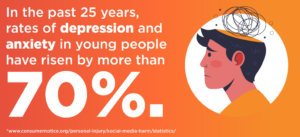Balancing Internet Use and Mental Health
January 26, 2024
With a vast array of communication tools, educational and work platforms, entertainment and information at your fingertips, the internet is an undeniably crucial resource needed in today’s world. There are many positives of having access to the world wide web, but as the online world has advanced, negative outcomes of too much internet use have immerged, including effects on mental health.
Overuse of the internet has shown to cause anxiety, depression, sleep deprivation and low self-esteem. To understand how you can prevent these negative effects, you must first understand how they occur.
Social Media
Social media is a great way to stay connected with friends and family, meet new people and join interest groups, but it can also create a need for validation. Receiving attention in the form of ‘likes’ and ‘views’ triggers the release of dopamine in the brain, creating feelings of pleasure, satisfaction and motivation. Because of this, posting and the monitoring of those posts can be highly addictive.
Scrolling through images of others and their lifestyles produces a state of constant comparison. You end up comparing your physical appearance, style, wealth and relationships with the often-edited images and highlight reels posted by others. Experts tell us consistent consumption of postings to which our own lives seem inferior often causes depression and low self-esteem in chronic scrollers.
Manage social media’s adverse effects by setting daily time limits on the platforms. Using the timer function on your phone is a great start. If a more automated method is necessary, apps like Cold Turkey and AppBlock will monitor and shutdown any apps on your devices according to the boundaries you set. Creating a more productive scrolling environment can help protect your mental health – be selective on the people and pages you choose to follow.
Constant Communication
The creation of smart phones and other mobile devices has made us available to the world 24/7. Emails, texts and instant messages allow people to reach us even as we are moving. Constant notifications often cause feelings of anxiety and a need to respond immediately.
Setting downtime from constant communication is essential to a well-balanced life. Silence or place your cell phone in another room if you need a break. Phone call notifications may be left enabled, while disabling all other notifications. This will keep you accessible in case of an emergency, yet still limit the quantity of interruptions.
Too Much Time Online
Watching YouTube videos, reading the news, playing games – there is so much to do online! As easy as it is to fall into a rabbit hole of endless videos or games, excessive use of devices can disrupt sleep and lead to depression.
Blue light from electronic devices can slow or completely stop the release of melatonin, a natural sleep hormone. Prevent sleep deprivation and its associated effects by avoiding the use of electronic devices two hours before bed. The end of the day is a great time to read a book, play a board game or meditate.
Consider how much of your free time is spent online. According to Statista, the average person spends just under 7 hours online every day. People who engage regularly in activities like painting, cooking, music and sports are less likely to suffer from depression than those who do not.* Instead of mindlessly scrolling to pass the time, try engaging in a new, more productive activity to help reduce your risk of depression.
*Study conducted by the National Institute of Health.
The internet is an important tool we all need in our day to day lives, but learning to balance your internet use is vital to maintaining good mental health. Read on for more tips.
-
Set screen-time limits and block unproductive websites through the MidSouth Fiber app.
-
Take internet breaks throughout the workday – spend time completing offline tasks
-
Avoid checking social media at every moment of downtime
-
Create a list of activities to do when you find yourself spending too much time online: Read, write, paint/draw, exercise or spend time outside, play a board or card game, complete chores, volunteer in your community, host a game night with friends, etc.
